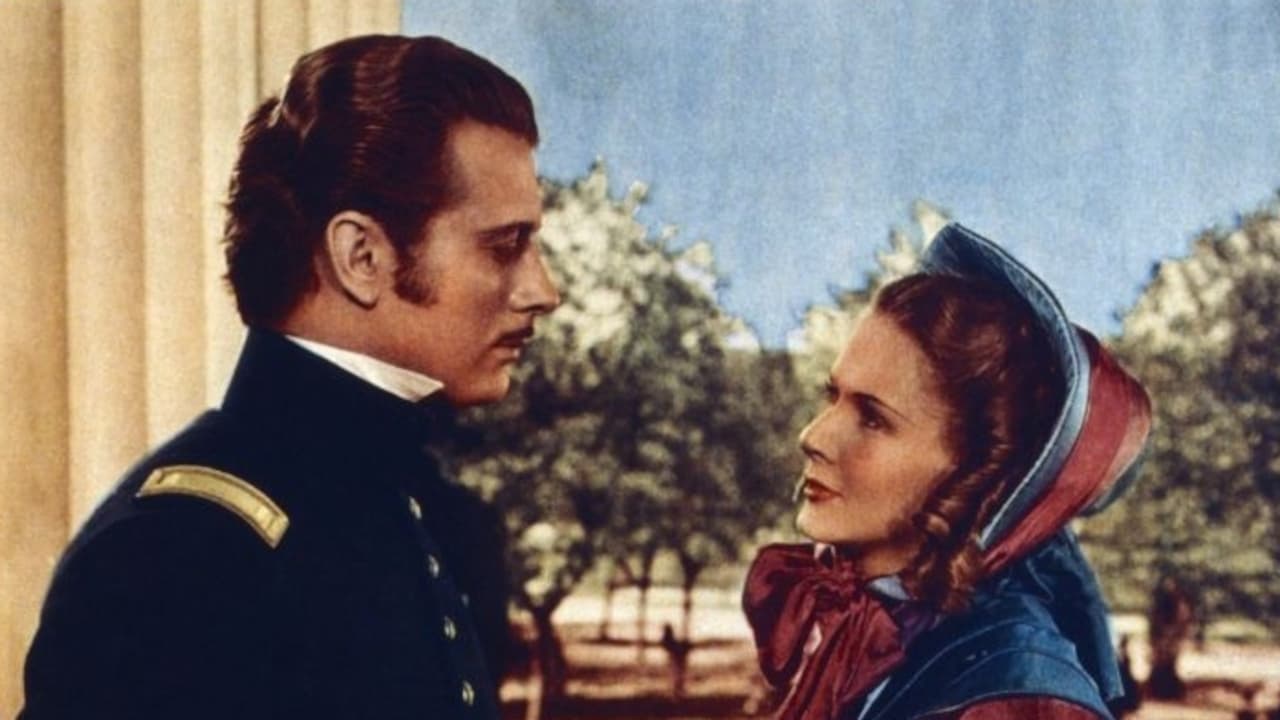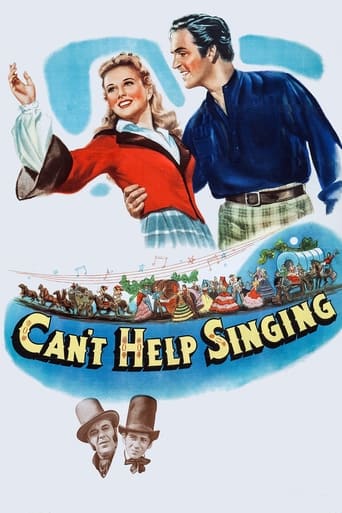

A very silly production is "Can't Help Singing." This 1944 film did not give the opportunity for Deanna Durbin to showcase her talent. Her voice was good; in fact, too good for this inane film. Her singing was way above the plot where a senator's daughter flees her father to run off with an army officer. This time dad is right. The only reason why the guy is interested in her is to further his career via her political father.Along the way, she meets a card shark and the two hit it off. The ending becomes silly when Durbin is forced to admit the stories she has made up along the way.Durbin sings the title song "Can't Help Singing" with great enthusiasm but the other songs, especially California-y are ridiculous as is the plot.
... View MoreDeanna Durbin was the Canadian opera star who saved Universal Studios (the dream factory, not the tourist attraction). Beginning as a 14-year-old in 1936's Three Smart Girls, she made 21 tuneful, attractive musicals that charmed America, and provided Winston Churchill with his favourite film, 100 Men and a Girl. Can't Help Singing is notable for a few reasons. It was Durbin's only colour vehicle, the only one with an Old West setting and the only one with songs by Jerome Kern, the tunesmith who wrote the score to Swing Time, was immortalised in the spotty 1946 biopic Till the Clouds Roll By (£3 at a shop near you) and was once discovered by '30s star Myrna Loy sitting on her porch, trapped in a glass jar.Durbin plays a flighty senator's daughter who heads out West after her caddish lover (David Bruce, whose character is abominably underdeveloped) but finds herself falling for travelling companion Robert Paige. Akim Tamiroff and Leonid Kinskey (Sascha in Casablanca) are a pair of feckless tramps also along for the ride, while Ray Collins (Gettys in Citizen Kane) is Durbin's father. The set-up, borrowed from the Capra/Riskin classic It Happened One Night, is solid, but the narrative moves too quickly, with a dearth of scenes charting the growing relationship between Durbin and Paige. The unfailingly charming leads do their best, despite Deanna having been made-up to within an inch of her life - boasting blusher that seems to be causing her near-constant embarrassment. It's a shame the script isn't stronger, as the songs are gloriously performed, with the big budget allowing them to be extravagantly, imaginatively staged.Durbin and Paige's duet to Can't Help Singing is a tremendous addition to the singin' in the bathtub tradition (think Winnie Lightner in The Show of Shows, Lena Horne in that legendary deleted scene from Cabin in the Sky, or me the other day, crooning Tom Waits as I washed my feet), with Californ-i-ay a superior precursor to Oklahoma!'s title tune and Any Moment Now really rather touching. One could argue that Elbow Room - performed by a knockabout chorus - is the most dispensable entry in the canon of 20th century song, but More and More more than makes up for it. Can't Help Singing doesn't rank with the best of the Durbin films, but it's good fun, with a slew of musical highlights making up for the slightly hurried plotting.
... View MoreThere is a reason Deanna Durbin was one of the top Hollywood stars from the mid-Thirties through the Forties. She was a natural actress with a fine face and figure and a deep- throated soprano she knew how to use. She was one of those people the camera loves. Her personality, direct and warm, comes straight across to the audience. She could handle all the immaculate make-up Hollywood gave her as she matured into a young woman, but there always was something of the tomboy about her. She had a natural exuberance, a sense of humor and a good-natured willingness to take pratfalls or march into mud-holes. And she was a professional at her craft. In this movie, Can't Help Singing, watch how she manages to wander through the woods singing, through bushes and over hillocks, avoiding branches, and periodically fronting pretty scenery. This scene is shot in long takes. I have no idea how many takes it took, but Durbin manages to move, sing, smile, emote a bit and hit all of her marks without any sign of effort or evidence of an editor's scissors used to mask mistakes. By the time Durbin was 14 she was major box office, and stayed there until she retired in 1950 at 29. She never liked the glitz and fan adulation of stardom. She and her third husband left for France right after she retired and that was that. She still lives just outside Paris, has turned down any number of film offers and hasn't granted an interview with anyone since 1949. As a person who was grounded in reality and decided to live her own life, Deanna Durbin gets a tip of my hat. Can't Help Singing is a lush, colorful musical about a young woman, Caroline Frost, daughter of a wealthy senator, who leaves Washington against the wishes of her father to meet the man she intents to marry. He is a cavalry lieutenant, and the senator has seen to it that his regiment has been sent to California to guard gold during the start of the Gold Rush. Caroline is determined, and along the way has to deal with steamboats, Russian con-men, a cross-country wagon, Indians, finaglers, grafters, boss-men and card sharps. The card sharp winds up holding more than cards. He turns out to be the romantic lead. After 90 minutes of songs, comedy, adventures and the occasional kiss, all ends well for everyone. This was Deanna Durbin's only color movie and the studio went all out. Can't Help Singing is stuffed with wide-open vistas, detailed studio sets and costumes that would make Vincente Minnelli envious. What makes the movie memorable, however (in addition to Durbin), are two songs from the score by Jerome Kern and E. Y. Harburg. From the moment the movie starts and we see Durbin driving a two-horse carriage singing "Can't Help Singing," it's time to sit back and smile. The number is one of those big, fat, intensely melodic songs that few composers besides Kern could pull off. She sings it twice, the last time part of a production that takes place in an outdoor western bath house. It pops up now and then as a melodic background line. The song works every time. The second Kern/Harburg show-stopper is "Californ-i-ay," where "the hills have more splendor; the girls have more gender." It's another major production number with a big melody and clever lyrics. Everyone and everything from the two leads to giant vegetables take part. The movie is pleasant enough, although the two Russian con-men get tedious and Durbin's leading man, while manly enough, doesn't make much of an impression. The movie belongs only to Deanna Durbin, as all of her films did. With those two songs from Kern and Harburg, it's worth spending some time with.
... View MoreFor reasons beyond comprehension, "Can't Help Singing" is a film no one I know has even heard of, much less seen, probably because Deanna Durbin, a child actress of the mid-1930s who blossomed into an alluring,witty, beautiful young woman in the 1940s, suddenly chucked her career in 1948, started a new life in the French countryside with her husband and subsequent children, and has never been heard from since. But, within a little more than a decade, she not only saved Universal studios from bankruptcy but was the most popular female star of her time. Watching her films today, one is amazed at how contemporary they--and she--are, particularly when she graduated from child star ("100 Men and a Girl," "Three Smart Girls") to a spunky young lady with a voice of pure velvet and a melting range of emotions (from rueful to sensual). "Can't Help Singing" is a luscious introduction to the timeless charm of Ms. Durbin. Her first--and only-- film in Technicolor, this lighthearted musical Western must have cost Universal a fortune--filmed mainly on outdoor locations in the Northwest, with one of Jerome Kern's most beautiful (and underappreciated scores). Forget the plot about a politician's daughter who, against her father's orders, heads West to track down her handsome cavalry lover (David Bruce) but, en route via covered wagon to the wild, wild West, finds herself locking horns--and finally arms--with a dashing, sarcastic cowboy (Robert Paige--whose good looks and soaring baritone are more than a match for Ms. Durbin's beauty and exquisite soprano).What counts is the ravishing color photography of Kern's songs--filmed on location in the great outdoors (the highlight, for me, is Ms. Durbin's soaring rendition of "Any Moment Now" filmed as she wanders through the breathtaking backdrop of Bryce Canyon--truly one of the most exquisite musical interludes in movie history). Add "More and More" (Oscar-nominated), "Californiay," and the knockout title song (performed by Ms. Durbin & Mr. Paige in adjoining outdoor bathtubs--don't ask!)and there's little more you could wish for in a movie--musical or otherwise. I've read that the film was a boxoffice disappointment and hastened Ms. Durbin's decision to call it quits a few years later. And most of the reviews I occasionally come across are generally lukewarm, if not hostile. Movie scholars might argue that, from an historical viewpoint, "Can't Help Singing" was an unintentional precursor of all the zesty, musical Westerns that were to enchant movie audiences during the next decade. Perhaps so. Who cares. I can't see how anyone can resist the once-in-a-lifetime glories of Deanna Durbin in her dazzling prime, the most beauteous use of Technicolor imaginable, and the entrancing melodies of probably our finest American composer, Mr. Kern. Thank you all very much.
... View More